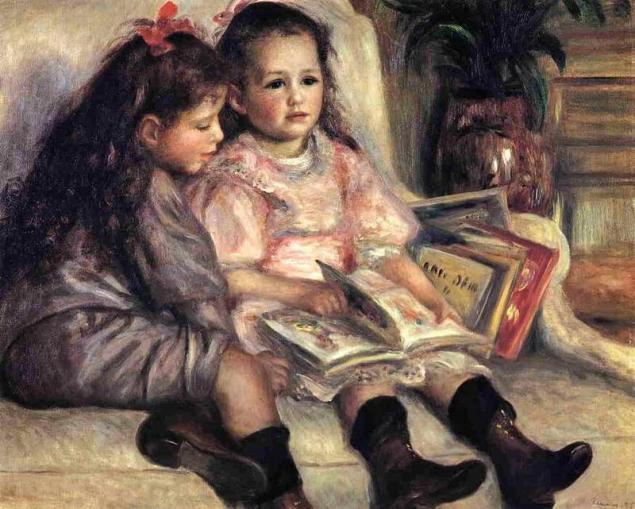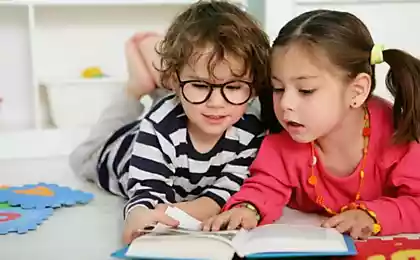581
Stop to present children with inadequate requirements
Physiologist, psychologist and doctor of biological Sciences Maryana Bezrukikh explains why problems with reading in children — it's not their problem, and our problems and how sometimes you need 30 years to prove the ineffectiveness of any methodology.

Charles Burton Barber — the results of tests, conducted in the second school 30 thousand schools, it was found that almost all the children responded well to the test tasks. However, 70% of them are unable to perform a more creative task: make sentences from the words that they suggested. Your opinion: what is the root of this problem?
— The inability to compose a sentence is an indicator of nesformirovannost of writing and writing. Actually — bad command of the native language. This is not surprising: studies of our Institute show that the beginning of schooling from 40 to 60% of children have immature speech, poor (very poor) vocabulary and inability to construct grammatically correct sentence, the inability to ask questions and to answer them. Recounting events, cartoons, fairy tales, children do not use detailed sentences, and individual words and interjections. Of course, the standard selected tasks and development of oral and written speech, but how it is realized, gives the result that we have.
— Can these problems be explained by the characteristics of a generation? The inability of these children to concentrate? Deficit of parental attention? Constant immersion in gadgets?
It is certainly not the problem of generation, that is not the problem children. This is a problem of education. The system, which it takes into account age peculiarities of the formation of complex basic skills — letters and reading. Forcing the pace of learning, insufficient consideration of individual peculiarities of development of children.
Today with the inclusion of the situation becomes even more complicated, the overall intensification of the educational process becomes an obstacle for the efficient formation of skills of reading and writing. What to talk about, if children are not taught to read "myself", they are taught, they are required articulated reading aloud, and then they somehow have to learn to read the "about myself", but articulation and pronunciation are preserved, which inhibits the growth of reading speed. And the amount is growing.
As for immersion in gadgets, it is not the cause of nesformirovannost the skill of writing and reading. It's more a factor of distraction, but we could use interest in the gadgets. Moreover, I am convinced that the urgent need to develop a technology for learning to write using a keyboard. Procrastination is unacceptable. We must be prepared to ensure that will not be necessary to write with a pen.
— What about the view that a letter with a pen develops a brain?
I assure you that the letter on the keyboard — even more complex task for the brain, which promotes the development of all functions is not less than the email handle.
— How seriously these students of various ages different from their peers twenty years ago? Sometimes parents and teachers say that the differences are so severe that it already supposedly "lost generation". Talking about this research?
— In our Institute during 60 years conducted studies of the functional development, state of health, mode, load children of different ages. We study the functional brain development and cognitive activity, peculiarities of intellectual development and learning difficulties, adaptation of children to different types of loads, risk factors, influencing the development and health of children, so we can compare today's preschoolers and schoolchildren with their peers twenty and even forty years ago.
The main conclusion that can be drawn is the rate of physiological and psychological development of today's children has not changed, and still are very great individual differences, that is, children the same age vary greatly in development and adaptive capabilities.
Of course, changing socio-cultural situation of development to influence some characteristics, but it is rather a psychological and sociocultural characteristics and brain development, cognitive activity and physiological life of the organism of children has not changed significantly. At the same time, load grow, the intensification of the educational process grows, the requirements grow. And we are forming a "lost generation" due to inadequate requirements and teachers, and parents.
— Can improve the situation only changes in the content of the educational standard, which says the Minister?
— I find it difficult to answer this question, because I do not know what the concept of "filling" of the standard. It seems to me that the question is not only "what to teach" and "how", taking into account age and individual characteristics of children.
"Content of education" remains essentially unchanged (with minor variations) for the last 50 years. But the "how" — today teachers decide at its sole discretion, creatively approaching the issue. However, creativity is good when there is a deep professional background, understanding and knowledge of the principles and methods of teaching. This is the biggest gap in the competences of teachers, so I often encounter with completely inadequate methods and techniques of teaching.
To cite one example: recently I saw "method" of teaching writing, in which children had to write letters upside down. To the question "Why?" the teacher, shrugging his shoulders, replied: "So interesting". And in our the Advisory centre today — the stream of five - and sixth-grade students have problems with writing, including they don't remember how to write the letter. What kind of skill may be involved, what kind of writing?

Pierre Auguste Renoir
— GEF primary education parents should be involved in the education of their children. This is a great achievement, although the forms of their real participation is often uncertain. What advice would you give parents? What these kids lack in the family?
— Involvement of parents is another "feature" of recent years, the school realized a specific, effectively shifting responsibility for learning outcomes on parents. And so today we have Tutors engaged with the primary school pupils. This is not isolated cases, it is a system that is gaining popularity. The market for these services, of course, will grow, if a teacher tells parents that the child "fails" and can only help the tutor. Read the forums of the parents — they share the experience of training "projects" (today it is possible even in kindergarten), Handicrafts, essay writing, etc. They are trying, worried, worried because of the bad ratings...
Is the teacher giving such task, does not understand that the child cannot do? Who are we kidding? The question is not rhetorical, but essential. If the teacher of an elementary school cannot teach a child to read, write and count (and this involved tutoring in elementary school), then the questions are not for the child not to the parents, and for professional qualification of a teacher.
On the question of what children are missing in the family, the answer is simple — I'm more than thirty years counseling children with school problems. They lack understanding and support. Hard pressure, violence, including physical, are not uncommon. And, as our research has shown, the causes of conflicts, school problems. The circle, which can only be broken by empowering teachers and educating parents. It should not be one-time events or lectures, and the system, consistent work.
— Listen to your feedback, the developers of the standards, techniques, tutorials?
— We listen carefully to almost always agree, but take into account? Rather no than Yes. For example, nearly 30 years we have proven the harmfulness, the discrepancy functional capabilities of the child the skill of continuous writing and speed reading.
In the modern standard of these requirements, but there are Methodists, that today and check the speed reading "with a stopwatch in hand". Like many ill-conceived innovations of the Ministry of education, they gradually come to naught, but officially no one cancels.published
Author: Maryana Bezrukikh
P. S. And remember, just changing your mind — together we change the world! ©
Source: newtonew.com/parenting/bezrukhih-children-reading

Charles Burton Barber — the results of tests, conducted in the second school 30 thousand schools, it was found that almost all the children responded well to the test tasks. However, 70% of them are unable to perform a more creative task: make sentences from the words that they suggested. Your opinion: what is the root of this problem?
— The inability to compose a sentence is an indicator of nesformirovannost of writing and writing. Actually — bad command of the native language. This is not surprising: studies of our Institute show that the beginning of schooling from 40 to 60% of children have immature speech, poor (very poor) vocabulary and inability to construct grammatically correct sentence, the inability to ask questions and to answer them. Recounting events, cartoons, fairy tales, children do not use detailed sentences, and individual words and interjections. Of course, the standard selected tasks and development of oral and written speech, but how it is realized, gives the result that we have.
— Can these problems be explained by the characteristics of a generation? The inability of these children to concentrate? Deficit of parental attention? Constant immersion in gadgets?
It is certainly not the problem of generation, that is not the problem children. This is a problem of education. The system, which it takes into account age peculiarities of the formation of complex basic skills — letters and reading. Forcing the pace of learning, insufficient consideration of individual peculiarities of development of children.
Today with the inclusion of the situation becomes even more complicated, the overall intensification of the educational process becomes an obstacle for the efficient formation of skills of reading and writing. What to talk about, if children are not taught to read "myself", they are taught, they are required articulated reading aloud, and then they somehow have to learn to read the "about myself", but articulation and pronunciation are preserved, which inhibits the growth of reading speed. And the amount is growing.
As for immersion in gadgets, it is not the cause of nesformirovannost the skill of writing and reading. It's more a factor of distraction, but we could use interest in the gadgets. Moreover, I am convinced that the urgent need to develop a technology for learning to write using a keyboard. Procrastination is unacceptable. We must be prepared to ensure that will not be necessary to write with a pen.
— What about the view that a letter with a pen develops a brain?
I assure you that the letter on the keyboard — even more complex task for the brain, which promotes the development of all functions is not less than the email handle.
— How seriously these students of various ages different from their peers twenty years ago? Sometimes parents and teachers say that the differences are so severe that it already supposedly "lost generation". Talking about this research?
— In our Institute during 60 years conducted studies of the functional development, state of health, mode, load children of different ages. We study the functional brain development and cognitive activity, peculiarities of intellectual development and learning difficulties, adaptation of children to different types of loads, risk factors, influencing the development and health of children, so we can compare today's preschoolers and schoolchildren with their peers twenty and even forty years ago.
The main conclusion that can be drawn is the rate of physiological and psychological development of today's children has not changed, and still are very great individual differences, that is, children the same age vary greatly in development and adaptive capabilities.
Of course, changing socio-cultural situation of development to influence some characteristics, but it is rather a psychological and sociocultural characteristics and brain development, cognitive activity and physiological life of the organism of children has not changed significantly. At the same time, load grow, the intensification of the educational process grows, the requirements grow. And we are forming a "lost generation" due to inadequate requirements and teachers, and parents.
— Can improve the situation only changes in the content of the educational standard, which says the Minister?
— I find it difficult to answer this question, because I do not know what the concept of "filling" of the standard. It seems to me that the question is not only "what to teach" and "how", taking into account age and individual characteristics of children.
"Content of education" remains essentially unchanged (with minor variations) for the last 50 years. But the "how" — today teachers decide at its sole discretion, creatively approaching the issue. However, creativity is good when there is a deep professional background, understanding and knowledge of the principles and methods of teaching. This is the biggest gap in the competences of teachers, so I often encounter with completely inadequate methods and techniques of teaching.
To cite one example: recently I saw "method" of teaching writing, in which children had to write letters upside down. To the question "Why?" the teacher, shrugging his shoulders, replied: "So interesting". And in our the Advisory centre today — the stream of five - and sixth-grade students have problems with writing, including they don't remember how to write the letter. What kind of skill may be involved, what kind of writing?

Pierre Auguste Renoir
— GEF primary education parents should be involved in the education of their children. This is a great achievement, although the forms of their real participation is often uncertain. What advice would you give parents? What these kids lack in the family?
— Involvement of parents is another "feature" of recent years, the school realized a specific, effectively shifting responsibility for learning outcomes on parents. And so today we have Tutors engaged with the primary school pupils. This is not isolated cases, it is a system that is gaining popularity. The market for these services, of course, will grow, if a teacher tells parents that the child "fails" and can only help the tutor. Read the forums of the parents — they share the experience of training "projects" (today it is possible even in kindergarten), Handicrafts, essay writing, etc. They are trying, worried, worried because of the bad ratings...
Is the teacher giving such task, does not understand that the child cannot do? Who are we kidding? The question is not rhetorical, but essential. If the teacher of an elementary school cannot teach a child to read, write and count (and this involved tutoring in elementary school), then the questions are not for the child not to the parents, and for professional qualification of a teacher.
On the question of what children are missing in the family, the answer is simple — I'm more than thirty years counseling children with school problems. They lack understanding and support. Hard pressure, violence, including physical, are not uncommon. And, as our research has shown, the causes of conflicts, school problems. The circle, which can only be broken by empowering teachers and educating parents. It should not be one-time events or lectures, and the system, consistent work.
— Listen to your feedback, the developers of the standards, techniques, tutorials?
— We listen carefully to almost always agree, but take into account? Rather no than Yes. For example, nearly 30 years we have proven the harmfulness, the discrepancy functional capabilities of the child the skill of continuous writing and speed reading.
In the modern standard of these requirements, but there are Methodists, that today and check the speed reading "with a stopwatch in hand". Like many ill-conceived innovations of the Ministry of education, they gradually come to naught, but officially no one cancels.published
Author: Maryana Bezrukikh
P. S. And remember, just changing your mind — together we change the world! ©
Source: newtonew.com/parenting/bezrukhih-children-reading























